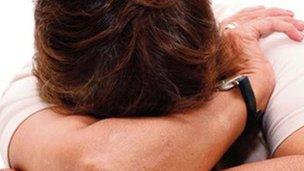Living with depression phone-in
- Published

Depression can last for weeks or months
During 2012, BBC Radio Cornwall is continuing to run a series of phone-ins about mental health.
The Cornwall Partnership Foundation Trust is responsible for mental wellbeing and has been awarded a grant to free up consultants to take calls from listeners.
Specialist clinicians will offer advice and support on a range of topics including depression, children's behaviour and drug and alcohol addiction.
On Wednesday 4 January 2012 BBC Radio Cornwall's Laurence Reed hosted a phone in and discussion about depression.
According to the Cornwall Partnership Foundation Trust, depression is a serious illness that can affect one in ten people.
It is very different from those familiar feelings of being unhappy, or fed up for a short period of time.
Those who suffer from depression may have feelings of extreme sadness that can last for a long time.
They can be severe enough to interfere with daily life.
Depression can last for weeks or months, rather than days.
The illness can affect people of all ages. If your families have a history of depression you may be more likely to experience depression yourself.
The symptoms can be complex. You often lose interest in the things you used to enjoy.
There are different levels of depression:
•Mild depression has some impact on daily life
•Moderate depression has a significant impact on your daily life
•Severe depression makes the activities of daily life nearly impossible - a small proportion of people with severe depression may have psychotic symptoms.
Depression can have many triggers. Upsetting or stressful life events, such as bereavement, divorce, illness, redundancy, job and money worries can be the cause.
Usually different causes combine to trigger depression. You may feel low after an illness and then experience a stressful life event, such as bereavement which leads to depression.
There are several different types of depression:
•Postnatal depression - this is treated in a similar way to other forms of depression, with talking therapies and antidepressant medicines.
•Bipolar disorder - this is also known as 'manic depression'. There are periods of depression and also periods of excessively high mood (mania)
•Seasonal affective disorder (SAD) - is also known as 'winter depression'. SAD is a type of depression that has a seasonal pattern usually related to winter.
Useful contact numbers
Further information and help is available from your local Community Mental Health Team:
Caradon: 01579 335 226
North Cornwall: 01208 251 446
Restormel: 01726 291 212
North Carrick: 01872 356 000
South Carrick: 01326 434 708
North Kerrier: 01209 881 888
South Kerrier: 01326 435 860
Penwith: 01736 575 555